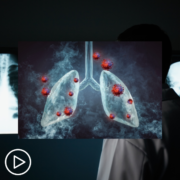Fact or Fiction? Busting Myths About Non-Small Cell Lung Cancer
Fact or Fiction? Busting Myths About Non-Small Cell Lung Cancer from Patient Empowerment Network on Vimeo.
Dr. David Carbone debunks common misconceptions about non-small cell lung cancer, including treatment effectiveness, age and lung cancer, and patient’s quality of life after treatment.
Dr. David Carbone is a medical oncologist and professor of internal medicine at The Ohio State University. Dr. Carbone is also co-leader of the Translational Therapeutics Program at the OSUCCC – James, where serves as director of the Thoracic Oncology Center. Learn more about Dr. Carbone, here.
See More From INSIST! Lung Cancer
Related Resources:

|

|

|
Transcript:
Katherine:
A lung cancer diagnosis often has a certain stigma associated with it, but the majority of that is not based in fact. So, I’d like to play a little game with you called Fact or Fiction. All right? All right, first one. Fact or fiction: Lung cancer is a disease of the older population.
Dr. Carbone:
If you have lungs, you can get lung cancer. That’s it. I’ve seen 20-year-old lung cancer patients. So, I think it can happen to anybody, and unfortunately, things like the CT screening programs are limited to people over the age of 50, but I’ve had many patients in their 30s and 40s. So, if you have lungs, you can have lung cancer.
Katherine:
Okay. Next one, fact or fiction: Quality of life is greatly diminished after undergoing treatment for lung cancer.
Dr. Carbone:
I completely – fiction. I actually tell people often their quality of life is dramatically improved after starting treatments, and that’s my goal.
And with the new treatments, that’s often true. People will tell me within a week that they feel so much better on the treatment than they did before. So, that’s our goal. Our goal is not to make you feel worse. Our goal is to make you feel better.
Katherine:
Of course. All right, last one. Fact or fiction: There are no effective treatments for advanced lung cancer.
Dr. Carbone:
So, the average survival for lung cancer years ago was four to six months from the time of diagnosis to death. That’s bad. And now, we are seeing in these subsets of patients years and years of survival with simple even pill-type treatments or immunotherapies. And even with the immunotherapies, sometimes you get treatments for a year or two, and then we stop; and we have patients who are years later, off of all treatments for metastatic lung cancer, still with no evidence of disease.
So, that is definitely fiction. We have highly effective treatments for lung cancer. But unfortunately, like everything else, and like I’ve said multiple times, it’s not true for everyone. Our treatments aren’t ideal. Sometimes for a particular patient we can’t find a matching treatment, the standard treatments don’t work, and nothing we can find makes a difference. But I would say you never know that until you try, and for the vast majority of patients, we can definitely give them prolonged, good-quality life. And so, I think that that’s definitely fiction.










